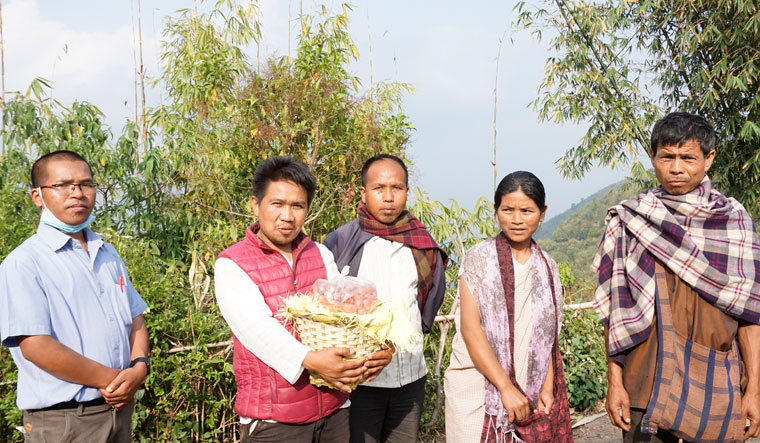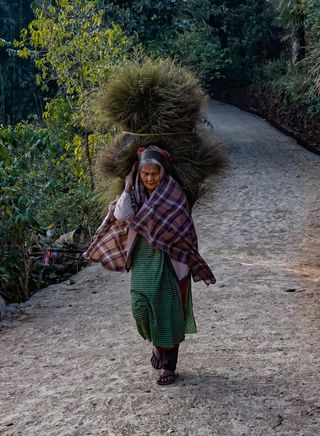Nestled between Meghalaya’s Sohra and Pynursla ridges—in a lush, cloud-covered valley 65km from Shillong—is a serene village called Kongthong. When the clouds part, one can get a glimpse of Bangladesh. But it is not the village’s beauty that has been attracting hordes of tourists from all over the world to it. It is, rather, the ancient tradition of tune-giving, or Jingrwai Iawbei (tune in honour of the root ancestress). Each of the 700 villagers in Kongthong is not known by a name, but by a tune. Within a week of a baby’s birth, the mother assigns the child a tune, which becomes their name.
Until a few years ago, Jingrwai Iawbei remained an obscure practice unknown to those outside Kongthong and a few neighbouring areas. One of the people who has been working hard to put the ‘whistling village of India’ on the world map is a Kongthong community leader called Rothell Khongsit. Everything about him seems uneven—his hair, teeth and the way he speaks English—which gives him the air of a Bollywood sidekick. But the perpetual smile in his voice is refreshing, as though things are always sunny in his world.
The impression might be misleading, because it has not been an easy journey for Khongsit. He studied up to class 7 in the village and then moved to Shillong. After completing his BCom, he joined the Meghalaya Village Development Society. As part of his job, he visited all the rural areas of the state, and the experience instilled in him a spirit of service. But slowly, a sense of dissatisfaction started creeping in. He was working for the state, but was not able to do anything for his own village, which remained without a figurehead to guide, inspire or motivate the people. So, he quit his job.
“I am poor and my parents are poor,” he says. “They sent me to Shillong to study so that I could return with a good job. When I told my mother that I had resigned from my job to work for my community, she started crying. ‘I sent you to school so that you could earn a good income,’ she said. ‘Why do you want to suffer again like us?’ But now that my contribution to the village is starting to get noticed, she is happy. ‘Maybe we are poor, but I can see that everyone loves you and supports you,’ she said.”
What really inspired him to quit his job was an encounter with an IAS officer from Shillong who told him that if he could promote its whistling tradition, it might mean development for the village. He suggested that Khongsit form a society through which support could be provided. So, he took the lead in forming the Indigenous Agro Tourism Cooperative Society in Kongthong. “In the beginning, the society had three graduates, of whom I was the eldest,” says Rothell. “Before 2014, Kongthong had no road connectivity. The society took the lead in building roads. We have also built three Travellers’ Nests (guest houses) for tourists. From 2015, we have hosted guests from all over the world. Ever since the village became a tourist destination, the government has undertaken developmental activities for the people of Kongthong.” Khongsit has three sons and he helped his wife find tunes for each of them. “Because I play the duitara (a traditional instrument), I am familiar with all the folk songs,” he says. “Although my wife is the one who picked out the tunes for my sons (as tradition dictates), I helped her, because I wanted the best possible tunes for them.”
Dr Piyashi Dutta, who hails from Shillong, has been doing extensive research on matriliny and folk traditions of the Khasi tribe, with a focus on Jingrwai Iawbei. Her work on it provides some of the few academically documented details about this tradition. Currently working as an assistant professor with Amity School of Communication, Noida, she says that Khongsit is like a brother to her. “When you meet him, you realise he is such a simple person, always ready to guide you,” she says.
According to her, the people of Kongthong are very warm and the villagers have treated her like a daughter. “Jingrwai Iawbei is not just any tune for an individual; it is a way of connecting with their roots, paying homage to the root ancestress and seeking their blessings for the new-born. It is a shared identity of the community,” she says. “Jingrwai Iawbei is a one-of-its-kind cultural heritage, not only in India but also across the globe, and needs to be preserved.”
As per the 2011 census, Kongthong is a scheduled tribe village. Agriculture is the primary occupation, and agricultural land is situated on the hill slopes. There are 10 major clans in the village, four of whom—the Khongsit, Majaw, Lynrah and Pohnong—claim to be its founders.
“When you walk into the village, you can feel something floating in the air,” says Dutta. “If you pay close attention, you will find it to be an eerie sound. Soon, you realise that it is a whistle. Somebody from afar might be calling somebody else.” She says one of the reasons this tradition has survived is because a song carries farther than a name. “When they are working in the fields, singing a tune reaches the other person faster than calling out his name,” she says.
Currently, Khongsit is involved in a village beautification programme, whereby around 200 villagers are engaged in planting saplings and fencing the football field. During our video call, he proudly shows me all the work that is being done under his supervision. Finally, he takes me to a middle-aged woman who is plucking weeds by the field. According to Khongsit, she is considered to be one of the best tune-givers of Kongthong. She has even composed a tune for Prime Minister Narendra Modi, a fan of whom most of the villagers are “because of all the developmental schemes he has instituted”. Khongsit asks her to call her son, and in a deep alto voice, she sings her son’s name. The sound washes over you like a tinkling waterfall. There is something about it that calms the soul. That is because, says Khongsit with his betel nut-stained smile, it is born of a mother’s love for her child.



